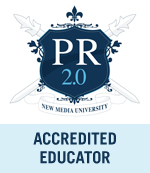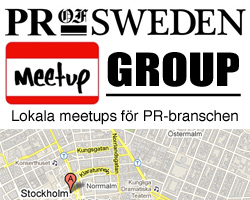Just a good song to start off your digital day. Here we go with the PR links:
- What Impact Has The New York Times Paywall Had on Traffic? [STATS]
- Counting Isn’t Measuring
- Cisco to shutter Flip: What does this mean for PR and marketing pros?
- Three Ways You Suck at Listening to Your Audience
- YouTube - Dani the #TigerBloodIntern - Round 3!
- Announcing PeerRatr: Rate Yourself and Your Peers
- Twitter Blog: Trends - now in 70 more locations
- Chicks With Steve Buscemeyes
- Two Specialties that Could Change Public Relations
- How to find a job (or how not to)
- 16 dygn och 12 timmar av er tid [SWE]
- How to Change Your Entire Life Overnight
- The Greatest TED Talk Riposte Ever Posted
- An Applebee’s serves tequila to a 15-month-old; chain calls it ‘unacceptable’ | Articles
Will paywalls be a solution or a slow suicide? The question is pointless without context.
If you’re thriving on attention in volumes, then it’ll be a problem. For instance, if you’re hung up on a traditional advertising model. Some people seem to think that it’ll work to expose people to commercial in-your-face-messaging even after they’ve paid good money for a product. They won’t. Not because they won’t, but because it’s too easy to challenge such a model with ad-free solutions.
So, if online media publisher want to work the paywalls, they got to prepare to go ad-free. Because they can’t just both have the cake and eat it.
This means that the revenues from the paywall must be greater than the revenue from advertising in an open and free platform context. Difficult, but not impossible. However, a large audience gives the platform a strong voice, a sort of public authority which in turn affects ad spends in a positive direction. Losing ad value might be a problem going with a paywall, but it’s even worse for a publisher to gain less authority.
So, the “paywalled” content must be pretty awesome to work. But news media content, to it’s very nature, is all about ‘push’. It only becomes ‘pull’ when it gets to become long-tail searchable content. And the problem with ‘push’ content is, that it’s impossible for a consumer to know if they are willing to pay for tomorrow’s news stories.
Because even if much content is free today, relatively few subscribe to news feeds. I’ve tried, but it’s just clutter. It’s like opening up a news paper–out of 20 stories only two, on a good day, really interests me. But I needed to read those two, so I just browsed the whole thing anyway. With new technology, we cease to see the point with that sort of behavior.
And it’s not like we’re getting less informed…
Personally, I’m not against paywalls per se. If you for instance have a highly curated and searchable database with content or contacts, then you could have it behind a paywall and it might work. You may want to try throwing in a couple of ads, but my bet is that the people who paid to get in on the inside will consider it to be tacky and disturbing.
You can also work a paywall if you offer the community to go with it. If you are publishing high end content which is being discussed by niche influentials, sure. But mass market news? It’s basically a violation of the whole idea of getting the word out to the world.
I know that journalists often cheer happily when a wire service picks up their stories and it goes “viral”. This is seriously an important distinction for future journalism and the basics of all writing in general—who are you writing for?
If you’re writing for an elite audience who sees the value in having exclusive access, then paywall might be the way to go. It’s why newsletters are easy to monetize, for instance. If you’re doing journalism for the greater good of man kind, telling stories you want the whole world to know about, then paywalls sucks. Not from the money perspective primarily, but for the ironic stupidity.
“If you’re that 34 waist and an average male, that’s probably pretty standard and unexciting information. But if you’re that 34 waist after two years of changing your lifestyle after having been a 52 waist and losing a life-altering amount of weight, that’s a bit different piece of information, and it carries drastically different relevance, both to you and to the others observing that number.”
Fuck, I’m a 36 waist. Gotta update to Runkeeper Elite.
I think with an Iphone and Bambuser, we’ll be fine.
“Social media is great. I use it every day and my business is almost entirely fueled by it, but the simple fact of things is that we still don’t know how to listen. Services such as SocialMention and sites such as Radian6 are a great start and vital to the listening practice, but just like having a phone and answering machine and keeping them in the basement, simply owning the tools aren’t enough. You have to practically and purposefully use them.”
+1!
I get a lot of questions on how to get yourself an internship, or how to stand out from the crowd when it comes to applying to an agency. Then take a look at this video.
Forget about Charlie Sheen for a while. She’s comfortable with using social media for communicating, shows great energy. And she knows her stuff. Damn, I wish I could use Youtube this well myself, my blog would be huge then! :)
I’m inspired, Dani!
Interesting service, I have to check it out. When I have time, that is…
Local trends is coming. I like it, it gives you more relevant possibilities to get sweet spot effects.
Scary.
“If I were making investments in the comms function, I would heavy-up on a world class analytics team.”
This is exactly what our company is doing, with global capacity. But this is a good blog post by a very smart man, I think.
This is sooo very good. Or not, you know what I mean. I get my fair share of resumes as well, and oh my… some are really stupid.
Nikke Lindqvist turns it all around by determining how much staff time that go inte the reco.se site and then compares it to how much time the visitors spend on the site. Interesting!
Need motivation?
Agreed, Spurlock’s assumptions is missing the target. Entertaining, but still.
I liked Dave Fleet’s post on it. I’m also passing this along, one more time just to really make sure:
“I’ve written before about the transition that people need to understand when they ask for money from companies in return for coverage. When you do that, you move from “earned” media to “paid” media.”
“The tequila was apparently mixed with apple juice and served in the child’s sippy cup. The parents discovered the drink after the child began acting “strangely,” WDIV in Detroit reported.”
Am I a horrible person who LOL when I read it?

 Connect on Facebook
Connect on Facebook Jerry Silfwer's LinkedIn Profile
Jerry Silfwer's LinkedIn Profile Spinn's Daily PR Links (RSS)
Spinn's Daily PR Links (RSS) Subscribe to Blog via E-mail
Subscribe to Blog via E-mail Follow @DoktorSpinn on Twitter
Follow @DoktorSpinn on Twitter My Workplace, Whispr Group
My Workplace, Whispr Group











